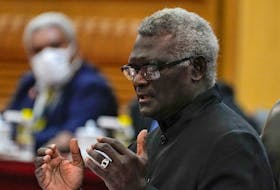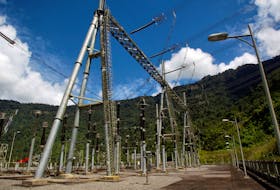ST. JOHN'S, N.L. — The Churchill Falls power plant is a prize. Its value is not just in a 5,428-megawatt (MW) generating capacity (compared to the 824 MW at Muskrat Falls downstream). The facility was estimated to be worth about $20 billion in 2018, and is paid off.
Power production there is cheap in comparison to many other sources. And the immense reservoir for the Churchill Falls (Labrador) Corp. (CFLCo) hydroelectric plant offers freedom in deciding when it’s dispatched.
CFLCo co-owners Hydro-Québec (34.2 per cent) and Nalcor Energy (65.8 per cent) have fought over the contract governing Churchill Falls — more to the point, the profits from the power sales — for decades. Under the existing arrangement, Hydro-Québec buys the bulk from the plant at the Quebec-Labrador border for roughly the price of production (operating costs are less than $3 per megawatt hour). The Quebec company then has the ability to transmit and sell to further-flung markets at a far higher price (most recently estimated $40 to $45 per MWh) and pocket the profit.
But the existing arrangement expires in 2041.
Managing director of Morrison Park Advisers, specializing in utilities, Pelino Colaiacova says there are difficult negotiations ahead, with just a few realistic options for either side. Given the route through Quebec is still the most efficient route to market for Churchill Falls power, he said, dealing with Hydro-Québec on a new arrangement makes sense, with reasonable offers.
“Hydro-Québec of course has first right on all transmission capacity inside Quebec. They’ll go find reasons to make the negotiations difficult. That’s the reasonable thing to do. If I were giving Hydro-Québec advice on how to commercially negotiate, it would be to come up with reasons to make it difficult,” he said Wednesday at the Muskrat Falls Inquiry. “They are tough bargainers.”
Colaiacova also said he would expect Hydro-Québec to keep adding new power generators inside its borders. Apart from the lure of profit, it doesn’t want to enter negotiations needing any Churchill Falls power.
"They’ll go find reasons to make the negotiations difficult. That’s the reasonable thing to do." — Pelino Colaiacova
But Newfoundland and Labrador will be helped by the completed Muskrat Falls project, Colaiacova said, because it shows an alternative route for Churchill Falls power is possible.
“It’s very easy for us to believe the subsea transmission route is a practical possibility for us today because the Maritime Link’s been built, the Labrador-Island Link’s been built, we know they can be built. All the geotechnical work was done to show exactly where lines should be dropped in the Strait of Belle Isle so icebergs don’t rip it apart. But that work wasn’t done in 1965 or 1970. It was only done recently. And even then, by the time there’s a negotiation related to Churchill Falls, there will have been years of performance of the Muskrat Falls infrastructure, of the transmission lines, to demonstrate that that infrastructure will last and is a practical alternative to a deal with Hydro-Québec,” he said.
The alternative to a new sales contract with Quebec, or transmission through Quebec, is a new set of transmission lines bypassing Quebec. In a back-of-the-napkin calculation (included in a very detailed report filed with the inquiry), Colaiacova said a new, subsea route built by Newfoundland and Labrador to the United States could require more than $4 billion in equity from Nalcor Energy.
The pricing offered by Quebec really determines the best option.
A report from Colaiacova filed with the inquiry suggests several possible scenarios for post-2041 arrangements. And whatever the scenario, it was estimated Churchill Falls could provide over $500 million a year in profit to Nalcor Energy, in today’s dollars.
Colaiacovo continues on the stand Thursday.
Twitter: @TeleFitz
RELATED








